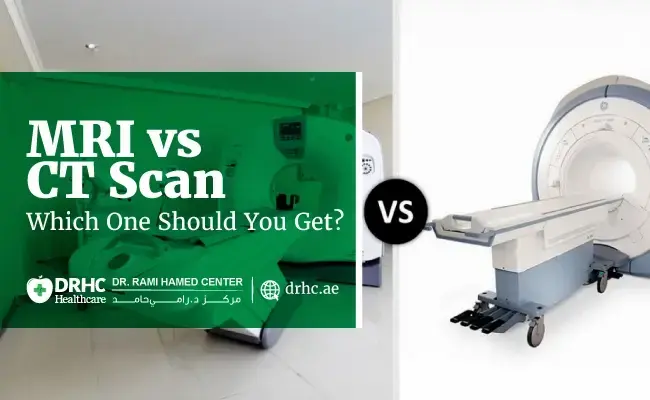
Infertility can be one of the most emotionally challenging experiences for individuals and couples who dream of growing their family. The path to answers isn’t always straightforward, and it’s natural to feel overwhelmed, frustrated, or even lost when test after test doesn’t yield clear results.
At Dr. Rami Hamed Center (DRHC) in Dubai, we believe that finding the cause of infertility begins with compassion, clear communication, and the right tools, one of which may include Magnetic Resonance Imaging (MRI).
In this blog, we explore how MRI can play a valuable role in diagnosing the causes of infertility and what to expect if your doctor recommends it as part of your evaluation.
What Is an MRI and How Does It Work?
MRI is a non-invasive imaging technique that uses strong magnetic fields and radio waves to create detailed images of internal organs and tissues, without radiation exposure. It’s particularly useful for examining soft tissues, such as the reproductive organs, which are often involved in infertility.
How Can MRI Help Diagnose Infertility?
While many cases of infertility can be diagnosed with ultrasounds, blood tests, or X-rays, MRI offers a more detailed view, especially when previous tests have been inconclusive or when complex conditions are suspected.
In Women, MRI Can Help Identify:
- Uterine abnormalities such as fibroids, adenomyosis, or congenital uterine malformations (e.g., septate uterus)
- Endometriosis, particularly deep or pelvic endometriosis, may not be visible on ultrasound
- Ovarian cysts or tumors that could affect ovulation
- Fallopian tube blockages or scarring in some cases
- Post-surgical scarring or complications that may interfere with implantation or embryo development
In Men, MRI May Be Used To:
- Evaluate the pituitary gland in cases of hormonal infertility
- Investigate blockages or congenital abnormalities in the male reproductive tract
- Examine the testicles or prostate if tumors or other abnormalities are suspected
MRI is often used alongside other diagnostic tests, rather than as a first-line tool, but it becomes essential when clarity is needed to move forward with effective treatment.
When Might a Doctor Recommend an MRI for Infertility?
MRI is usually recommended in specific situations, such as:
- You’ve had multiple failed fertility treatments without a known cause
- Your ultrasound or hysterosalpingography (HSG) results were inconclusive
- You have symptoms like chronic pelvic pain, painful periods, or abnormal bleeding
- There's suspicion of a rare or complex reproductive issue
- You’re being evaluated for reproductive surgery or assisted reproductive techniques (IVF, IUI)
At DRHC Dubai, our multidisciplinary team—including radiologists, gynecologists, and fertility specialists—work together to ensure that imaging is used appropriately and only when it adds real value to your diagnosis or treatment plan.
Explore Our Related Blogs
- Understanding Multi-parametric MRI for Prostate Evaluation
- Is MRI Safe During Pregnancy?
- Pituitary MRI and Hormonal Imbalance – What’s the Link?
- Why Women with Breast Implants Should Consider MRI
FAQs About MRI and Infertility
“Is the MRI painful or risky?”
Not at all. MRI is painless and doesn’t use radiation. You’ll lie still in the scanner for about 30 to 60 minutes, and you may hear some loud tapping noises, but you’ll be able to communicate with the technician throughout the exam.
“Do I need special preparation for a pelvic MRI?”
You may be asked to avoid eating for a few hours or to empty your bladder before the scan. In some cases, a contrast dye may be injected to improve the visibility of certain structures. Your care team at DRHC will guide you through every step.
“Can I have an MRI if I’m trying to conceive?”
Yes, but it’s important to let your doctor know if there’s any chance you could be pregnant. While MRI is generally considered safe during pregnancy (especially after the first trimester), timing and necessity will be carefully considered.
“Are there alternatives to MRI?”
Yes. Depending on your symptoms, an ultrasound, hysteroscopy, or laparoscopy may be used instead. However, MRI offers a non-invasive, high-resolution view of internal pelvic anatomy that other methods may not provide.
Fertility Evaluations at DRHC Dubai
Navigating infertility can feel overwhelming, but you are not alone. At DRHC Dubai, we provide comprehensive infertility evaluations using the latest diagnostic tools, including MRI, when needed. Our goal is to uncover the underlying causes—gently, thoroughly, and with compassion—so that you can make informed decisions about your care.
Final Thoughts
Infertility isn’t just a medical condition—it’s a deeply personal journey. Whether you’re just beginning to explore your options or seeking more advanced evaluations after previous attempts, MRI may offer the clarity you need to take the next step forward.
If you’re experiencing difficulty conceiving and want to understand your options, schedule a consultation at DRHC Dubai. We’re here to help you find answers—and support you every step of the way.
Hope begins with understanding. Let us help you discover the possibilities.
📞 +971 4 279 8800
🌐 www.drhc.ae
📍 Dubai Healthcare City, Building 52









Leave a comment